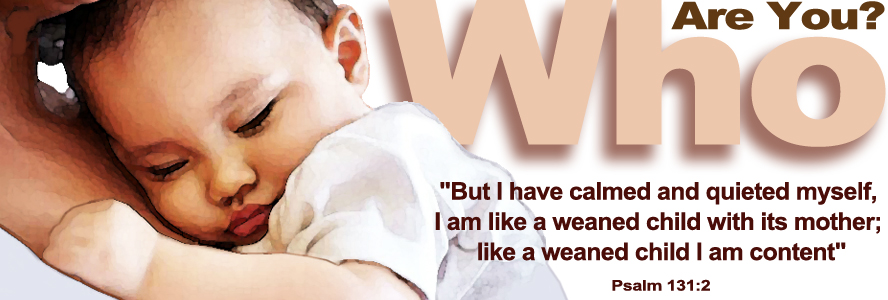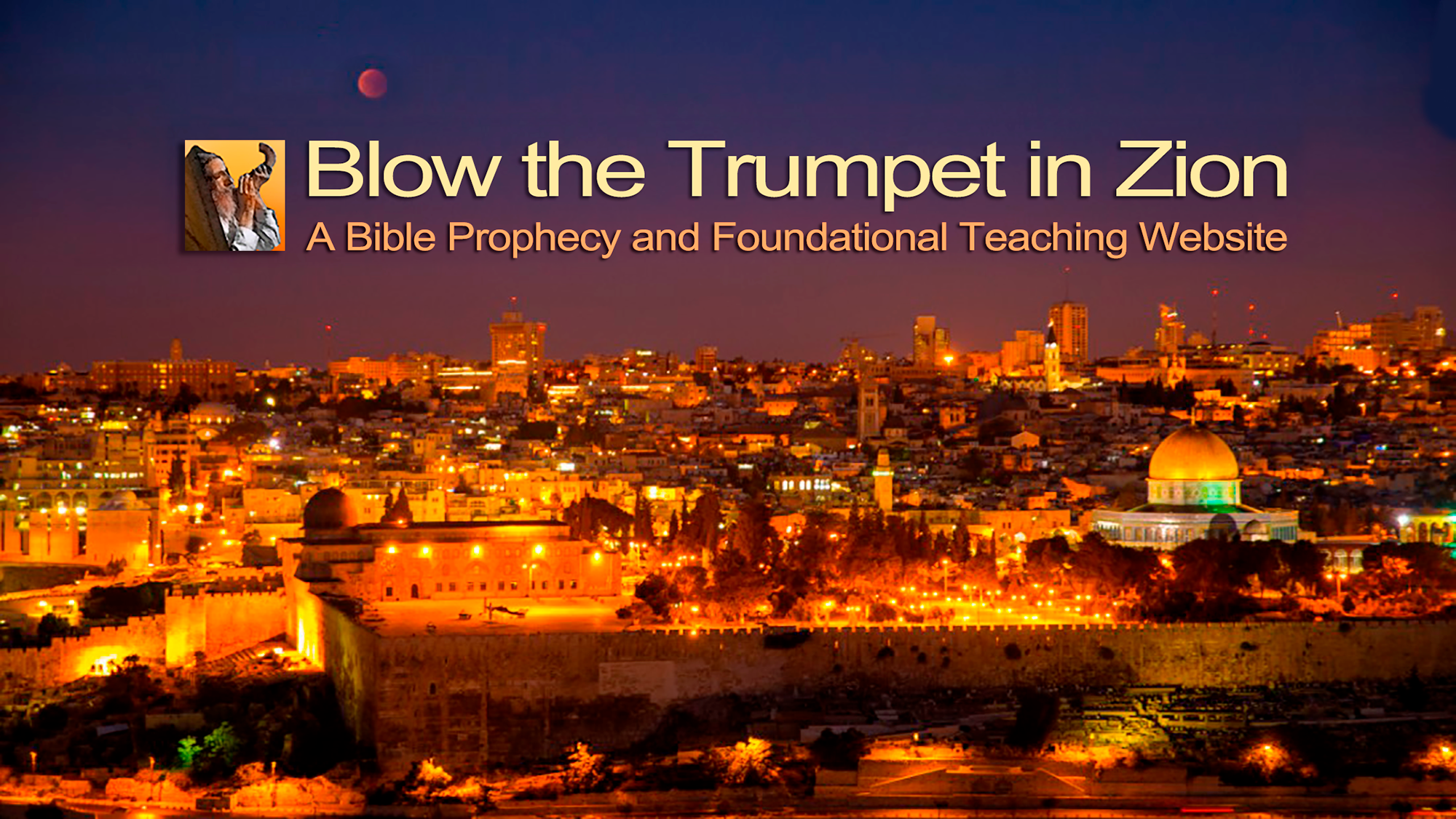
After watching a short video by Greg Hershberg a Messianic Jewish Rabbi who has had to battle with life-threatening health problems all of his life expounding on Psalm 131, I wanted to share some personal thoughts with you from the psalm that came to me as I watched this dear Messianic Rabbi as he was preaching. He asked the question “Who are you?” He was speaking to believers. It made me stop and think about my own walk with God and arrested my attention.
His emphasis in the preaching was not really a theological one but more so one that addressed a believer’s personal relationship with God. He was saying that we are not defined by what we can do or by what gifts we have or by our achievements or success in ministry or religious titles or theological qualifications but by our relationship with God. Psalm 131 is a short psalm three verses long in fact but profound in revealing the personal relationship we can know with our Heavenly Father as believers in the Lord Jesus, a relationship that defines who we really are in Him and in this world.
David, the beloved of God wrote; “My heart is not proud, Lord, my eyes are not haughty; I do not concern myself with great matters or things too wonderful for me. But I have calmed and quieted myself, I am like a weaned child with its mother; like a weaned child I am content. Israel, put your hope in the Lord both now and forevermore” (Psalm 131:1-3).
When I look back, over the years I spent a lot of time seeking the approval of others and, to a great degree, defined others spirituality by the gifts and abilities they had or their success rate in ministry. We live in a society that measures a person’s worth by their gifts, their talents, their money, their possessions, their profession and their standing or position within their field of employment or, in the case within wider Christendom, ones successful spiritual track record in their work for God.
You know we can spend a lot of time seeking to gain the approval of others and to be accepted by them and sometimes go to great lengths to have this happen. However, even though we may know from the Bible who we are in the Messiah and are able to define it from the Bible, sometimes in our deep minds we can still feel that it is not so for us especially when we think of our past failures, mistakes and sins that have so easily beset us. Sometimes we may even strive to understand great Biblical truths that are too wonderful to fully comprehend but often think that these truths are for others more spiritual but not for us.
David had realised that being concerned with great matters and things too wonderful for him to fully comprehend was not what really counted, but what he did understand was that being like a weaned child on the lap of its mother is that which brings true satisfaction and contentment and saw this in the light of his relationship with God. The Bible tells us clearly who we are as believers in the Lord Jesus, but even though we know this theologically we struggle many times to feel that we really are what He says we are in His Word the Bible (1 John 3:2).
If anyone had to face rejection, hostility from his enemies, rejection by his brethren, to be enshrouded by tumultuous and emotionally upsetting events, it was David, the beloved of God. He knew He was God’s designated King but what He knew factually most certainly was not his experience for many years. In this psalm of David we see that David did not define himself by his abilities or by the fact that he was a king. What defined David was his total reliance upon God for everything whether great or small and the personal relationship he had with Him and we see this expressed time and time again in the psalms he wrote.
The most important thing for David that he expresses in this psalm is when he writes; “But I have calmed and quieted myself, I am like a weaned child with its mother; like a weaned child I am content.” David understood who he really was in the LORD when, by faith, he rested as a weaned child rests content in its mother’s lap. He humbled himself before the LORD. He was not defined by his gifts or his talents or his position as king. He had passed through many harrowing experiences and had realised that there were many matters beyond his understanding. He knew the propensity of the heart to draw attention to ones abilities, gifts and position or social standing and would not be led down that path. His complete trust in the LORD was what defined him as the man God created him to be and this is true for us as children of God. David had discovered who he was in God and did not need man’s approval.
A weaned baby is one who from its birth has been sucking the life giving milk out of its mother’s breast. A baby loved and nourished by its mother is totally secure and at peace on its mothers breast. During that bonding time the baby knows by instinct and intuition that the mother has it in her care and that it feels perfectly secure and at peace. The new spiritual rebirth from above brings about this kind of relationship with God (John 3:3). Once this new spiritual rebirth has happened this new nature must be fed on the milk of God’s Word for it to spiritually grow and flourish (Romans 10:17). The apostle peter writes; “Like newborn infants, crave pure spiritual milk, so that by it you may grow up in your salvation” (1 Peter 2:2).
Once weaned the little baby knows the comfort of resting in the lap of its mother completely at peace and secure no matter what is happening around it. David had learnt and was still learning in all the changing circumstances of life that contentment with godliness is great gain (1Timothy 6:6). David had learnt to calm and quiet his soul as a weaned child does in the lap of its mother despite the soul’s tendency to experience the surging emotions that can bring about an anxious or troubled spirit and destabilise ones complete trust in God. Out of this secure relationship David had hope not only for himself but also for His brethren.
Biblical hope is not “I hope so” but a sure confidence in God that what He has promised He will deliver (Hebrews 11:1, 6). This hope did not come instantly or overnight for David and true spirituality does not come this way either. Training in spiritual matters takes time. Our human senses must be trained to discern good from evil, faith from fear and righteousness from unrighteousness (Hebrews 5:14). Only by keeping still and quiet in the lap of God as a weaned child and hanging on His every word will we learn that through faith and patience we will in due course inherit the promises (Hebrews 6:12). Out of this kind of personal relationship with the LORD will flow the gifts and calling of God that are irrevocable (Romans 11:29).
As a believer in the Lord Jesus you are not defined by your gifts or talents or titles or credentials or even by your failures and successes in life. You are not even defined by your past sins that have so easily beset you, neither are you defined by the approval or disapproval of others. What defines you in life is that you are resting in the lap of the LORD, talking every matter over with Him whether big or small, knowing that in all things God will work them together for the good of all those who love Him, who are called according to His purposes (Romans 8:28).
As we rest in Him and continually feed on His Word and place on His lap our surging emotions, fears, aspirations, anxieties, failures, successes or past sins, and continue to yield our bodily appetites and desires to Him, we will come to know His infinitely good, acceptable and perfect will for us in life (Romans 12:1-2). So then we are not defined by what we say or do or feel or by what others say about us but by the fact that we are accepted in the beloved Messiah our Lord Jesus (Ephesians 1:6). We have the privilege of being like a weaned child at rest in its mother’s lap knowing and feeling secure in the knowledge that God still has everything under control and He does you know.
Knowing the promises of God is a wonderful encouragement and added to this when we, by faith, rest in His lap and quieten our soul before Him the blessed Holy Spirit, the comforter Himself, will strengthen us as He constantly intercedes for us and with us and in place of us when words fail (Romans 8:26-27). What a wonderful sensitive, loving and divine friend we have in the blessed Holy Spirit who leads us into the Lord’s presence. Once again someone may ask you as a believer “Who are you?” According to this psalm of David our personal relationship with the Triune God defines who we really are in this fallen world and gives us the confidence to be always prepared to give an answer to everyone who asks us to give the reason for the hope that we have (1 Peter 3:15).

